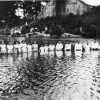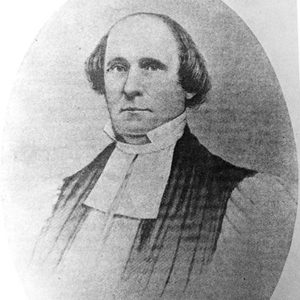calsfoundation@cals.org
George Washington Freeman (1789–1858)
George Washington Freeman was an Episcopal clergyman who served from 1844 to 1858 as the second missionary bishop of the Episcopal Diocese of Arkansas. He was the first bishop to reside in the state. His jurisdiction also included Indian Territory (present-day Oklahoma) and the Episcopal missions in the Republic of Texas.
George Freeman was born on June 13, 1789, in Sandwich, Massachusetts, to a strict Congregationalist pastor, the Reverend Nathaniel Freeman, and his first wife, Tryphosa Colton. He was the youngest of their twelve children. His father claimed that Freeman completed reading the entire Bible between the ages of six and seven.
Freeman married Ann Yates Gholson of Virginia in 1818, and they had three sons.
He was acquainted early in life with the Book of Common Prayer used by the Episcopal Church. His appreciation of the liturgy contained in the prayer book—coupled with his friendship with the Right Reverend John Stark Ravenscroft, first bishop of North Carolina—ultimately led him to decide to give up teaching at the age of thirty-seven and enter the Episcopal ministry in North Carolina. Prior to entering the ministry, Freeman taught at the New Bern Academy, where his brother, the Reverend Jonathan Otis Freeman, a Presbyterian minister, was the principal. In 1839, Freeman received a Doctor of Divinity degree from the University of North Carolina.
Ravenscroft ordained Freeman as a deacon on October 8, 1826, at Christ Church in Raleigh, North Carolina, and to the priesthood on May 20, 1827, at Christ Church in New Bern, North Carolina.
While serving in North Carolina, Freeman received some notoriety because of the publication of two sermons regarding slavery. Freeman was concerned about the spiritual welfare of slaves and slave owners and the treatment of slaves; however, he was not an abolitionist. Based on personal observations, he thought emancipated African Americans would face worse conditions than those faced by well-treated slaves. One discourse made an argument for slavery based on illustrations from the Bible, and the other used New Testament references to demonstrate how slave owners should be humane masters.
Freeman resigned as rector of Christ Church, Raleigh, in 1840 because his congregation would not conform to his rigid condemnation of dancing, playing whist, attending theaters and parties, and wearing current fashions using satin, lace, ruffles, and feathers.
Freeman served a number of parishes in North Carolina, Tennessee, New Jersey, and Delaware. He was elected Missionary Bishop of Arkansas and the Indian Territory at the 1844 General Convention. His jurisdiction also covered Episcopal missions in the Republic of Texas. He was consecrated as a bishop on October 26, 1844, at St. Peter’s Church in Philadelphia, Pennsylvania.
Freeman was the first bishop of Arkansas to be a resident of the state. His reports and correspondence tell of his dogged determination to recruit clergy and organize Episcopal parishes. He estimated that he traveled 18,000 miles in his many journeys throughout Arkansas and Texas by horseback, carriage, and steamboat. When Texas became a state and the Diocese of Texas was established, Texas Episcopalians elected Freeman to be their bishop. He declined but continued to serve Texas throughout the decade it took for Texas to have its own bishop.
Throughout his episcopate, Freeman was unable to recruit enough clergy to meet the needs of the Episcopal Church in Arkansas. When he began his work, there were three clergymen, one church building, and about seventy communicants. At the time of his death, Arkansas had two Episcopal church buildings, seven congregations, and about 400 communicants. His son Andrew Freeman became a priest and served Christ Church in Little Rock (Pulaski County).
Freeman died on April 29, 1858, in Little Rock and was buried in Mount Holly Cemetery in the same unmarked grave as his wife, who died in 1855.
For additional information:
Episcopal Bishops of Arkansas Correspondence. Special Collections. University of Arkansas Libraries, Fayetteville, Arkansas.
“Freeman, George Washington.” The Episcopal Church. http://www.episcopalchurch.org/library/glossary/freeman-george-washington#ma (accessed September 23, 2020).
Manning, Molly. “Freeman, George Washington.” NCPedia. http://ncpedia.org/biography/freeman-george-washington (accessed September 23, 2020).
McDonald, Margaret Simms. White Already to Harvest: The Episcopal Church in Arkansas, 1838–1971. Sewanee, TN: University Press of Sewanee, 1975.
Mary Janet “Bean” Murray
Little Rock, Arkansas
 Louisiana Purchase through Early Statehood, 1803 through 1860
Louisiana Purchase through Early Statehood, 1803 through 1860 Religion
Religion George W. Freeman
George W. Freeman 




Comments
No comments on this entry yet.